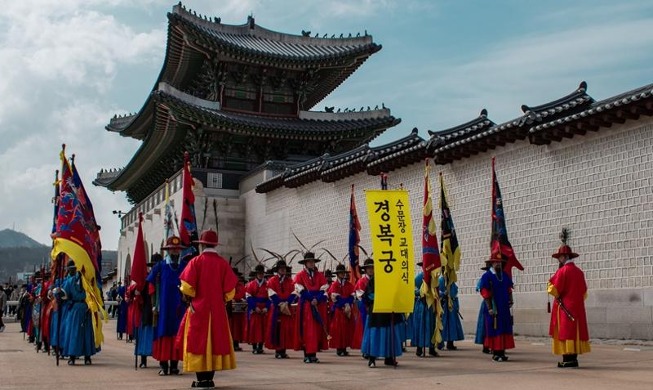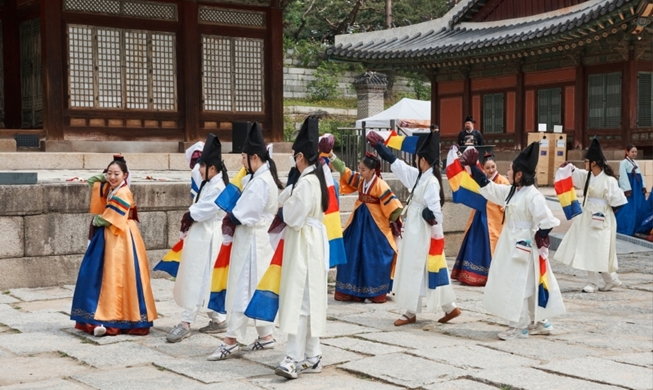-
 Korea.net's 24-hour YouTube channel
Korea.net's 24-hour YouTube channel- NEWS FOCUS
- ABOUT KOREA
- EVENTS
- RESOURCES
- GOVERNMENT
- ABOUT US
Among the many pianists of Korea, there is one who has been sticking with Beethoven for as many as 12 years. The pianist is Professor Choi Hie-yon at the College of Music of Seoul National University.
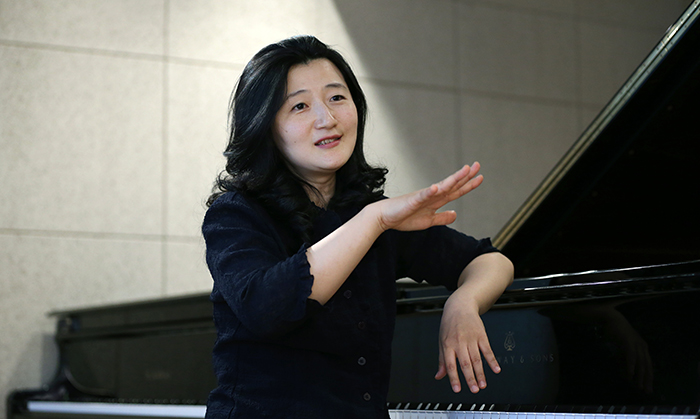
The 46-year-old pianist's journey to pursue the music of Ludwig van Beethoven (1770-1827) began in 2002 when she started a four-year project to undertake the full-length playing of all of Beethoven's 32 piano sonatas.
She then went on to hold a series of concerts accompanied by violinist Lee Mi-kyung in 2011 and 2012, covering all of Beethoven's violin sonatas.
The pianist didn't stop there. Most recently, last year she completed a cycle of all Beethoven piano trios, this time in collaboration with international virtuosos, including Italian violinist Ruggero Allifranchini and U.S. cellist Peter Stumpf.
Twelve years into her pursuit of the great composer, the pianist still finds it difficult. "I still have a long way to go."
Meanwhile, Choi realizes that what she's been doing is the most honorable thing to do as a musician. As she says, "I am so privileged to have communicated with audiences through the greatest composer, for such a long time. I am grateful and at the same time I feel great responsibility."
"For that reason, I can’t enjoy any 'lay-back moments' just yet since I still have a lot to do."
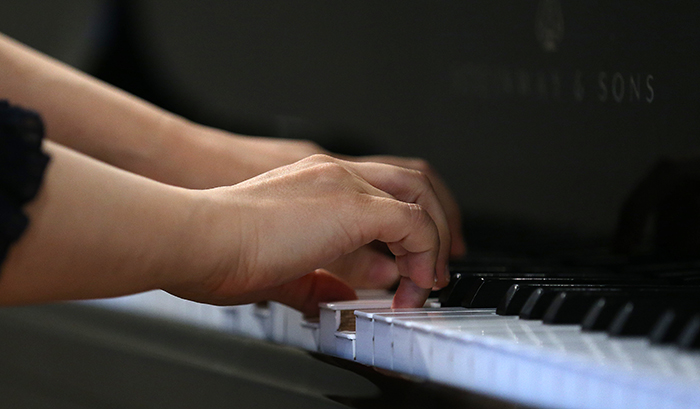
What brought her to where she is now are the ups and downs she had to go through, especially when she was far from home.
In high school, the young Choi decided to go abroad to expand her musical scope. She studied at the Berlin University of the Arts under Klaus Hellwig and Hans Leygraf. She graduated there with a doctorate in the Performing Arts.
In 1995, she crossed the ocean to study in the U.S., where she continued her studies at the Jacobs School of Music of Indiana University in Bloomington, Indiana, under György Sebők, and earned an Artist Diploma.
In 1999, the musician was appointed Professor at the College of Music of Seoul National University, unanimously for the first time in the university's history.
Beethoven was not always someone lovable for Choi. Sometimes, he could be the object of "love and hatred," especially when she was studying in Berlin. She had to endure harsh criticism, such as, "That doesn't even sound like Beethoven."
"I spent much time in agony, anxious to know what on earth were the 'Beethoven sounds' they [the German people] wanted to hear," she reminisced. "While doing the search," she said, "I underwent trials and errors and learned a lot."
Her relentless pursuit of Beethoven continues. The pianist is now in her run-up to another round of full-length Beethoven performances across the U.S. and Germany.
Recently, Korea.net met with Choi, who was on her way to Indiana to hold an upcoming Beethoven recital, to hear more of her stories.
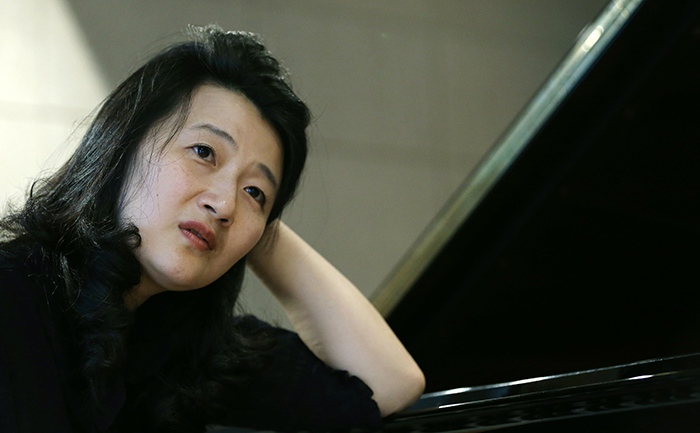
- Tell us what fascinated you the most about Beethoven.
I love the "positive energy" in his music. The first time I played his pieces, I never found it difficult at all. At that time, I didn't know each of the meanings embedded in his music. However, despite knowing nothing about it, everyone can feel the positive energy in his music.
As many people know, Beethoven was emotionally ill. Despite all the abuse and ordeals he had to endure throughout his life, he never succumbed to despair. Instead, he surmounted such difficulties through what he really loved: music. I believe his energy revived in each and every note he composed. I felt that energy from an early age. I admired what a hard-working person he was. He tried and tried until he reached the point of perfection.
Ironically, the more I delved into his music, the more I found it difficult. The more I dug into figuring out all the possible factors behind his positive energy, the more the process got difficult.
The energy, one that has been striking a chord with every listener for hundreds of years, was not made overnight. I believe that there are so many things behind the making of his music. I am still in the process of finding out what they really are.
- You have completed performances of all of Beethoven's piano sonatas. Many fans might be waiting for you to embark on another repertoire, let's say, Beethoven's piano concertos. Can we expect to see that happen sometime soon?
I've already done all his piano concertos, except No. 1, but I have not held a cycle of full-length performances with that repertoire yet, which I hope to try soon.
If given a chance, I'd like to do it together with a conductor with whom I can work in perfect harmony. A concerto cannot sound great unless one can keep in tune with another. Beethoven's music is so elaborate and sophisticated that it never sounds great if you don't have a great partner.
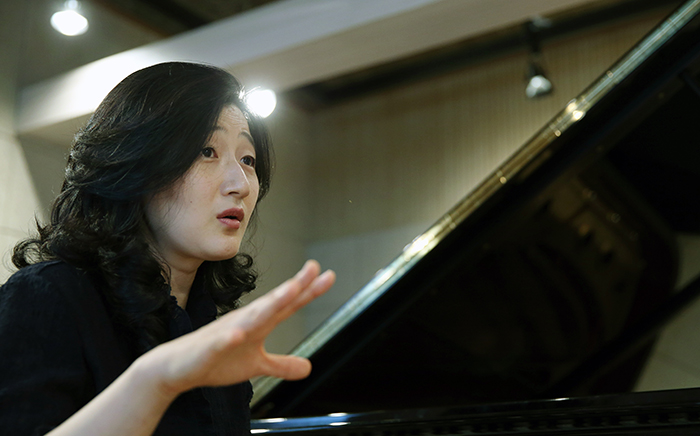
- If you had something more to do with Beethoven's music, what would it be?
I've been actively holding concerts, not only here at home, but beyond my national borders, too. I hope to have another round of performances of all of Beethoven's piano sonatas. I also want to study more about his symphonies too.
- What's your favorite among Beethoven's works?
That is the million dollar question. It's hard to pinpoint just one. My study into his music is still ongoing. I still find something new from a piece that I didn't fully understand just a couple of years ago. I am sure if I am posed the same question three years later, I would probably give a different answer.
When I turn 70 or something, I could give you the, "Yes! This is it!" piece, I think.
- How did you start playing the piano?
Next to my house was a piano academy. When I was only three years old, I went there by chance, where I was drawn to the melodies coming from a piano. Out of curiosity, I tried to play the piano. To be honest, my mom opposed the idea of letting me learn how to play the instrument at such a young age, when I hadn't even completed the Korean alphabet yet. Noticing my musical talent early, a teacher there, however, encouraged me to keep doing it. We started so-called "lessons between ourselves." My disgruntled mom watched me over the months and finally approved.
As I didn't have a piano at home, I kept going in and out of the academy to practice. In retrospect, it was my hunger for music that made me that passionate about the instrument. I had such a sense of perfect pitch that I could spot each and every tune very quickly. I was also noticeably quick to read scores. I used to digest a score and start playing it on the piano all by myself.
I clung to the instrument, losing track of time. My teacher even scared me into going home, showing me a portrait of a scary-looking man, who turned out to be Beethoven.
- Your story is definitely a testament to the maxim, "Hard-working people cannot beat those who like what they do, and those who like what they do cannot beat those who enjoy it.” Isn't it?
Yes, it is. Those who enjoy themselves, whatever they do, grow by leaps and bounds. I can see the difference in progress between those students who enjoy every moment and those who don't.
- Tell us what made you choose to become a pianist.
At the age of 18 when I was studying in Berlin, I was so worried about my future. I was like, "Is this where I am meant to be?" Such concerns about my life and my path lasted for four or five years.
Whenever I won a competition and was showered with applause from the audience, I felt like, "Yes, this is it." Dark times, however, did not fail to emerge. All my years in Berlin were shadowed by worries and agony. Luckily, I survived, letting my self-identity form naturally, and then I reached the, "Right. This is my destiny," point.
- Did you ever have any sort of crisis in your career?
Of course I did, not just once or twice, but so many times. The worst moment was when my mental anguish spread over to the physical. It was in 1995, when I was in Berlin, when I suddenly could not play the piano anymore. My fingers hurt so much, as if the keyboard had sharp saw blades pricking them. It was strange. Doctors kept saying, "There's nothing wrong with your fingers." I didn't know what to do. I thought that this might be a message from God to stop playing.
At that time, I was getting ready for a very important competition, one for which I'd prepared for many years. I had no choice but to participate in such a bad condition, and I messed it up, as expected. My Swedish professor, Hans Leygraf, worried about me and supported me all the time, but it didn't work.
Since for many years I had put all my energy and sweat into music, I hardly had any time to look around and care about other things around me. I think my mental stress went to extremes. So I realized that I should put my life back in order and decided to move to the U.S. The stay in the country was like being in a nursing home. There, I got a good rest and my life and health got back to normal. I felt at ease, looking around the people around me and getting to know how to love the people that I loved. Then, my crisis naturally passed away.
- What are your future plans?
I will hold a series of performances with a Beethoven repertoire in August in Germany and also perform a concert of Beethoven's cello sonatas with an Austrian cellist there.
In October, I will hold two performances here at home, including one with the Seoul Philharmonic Orchestra.
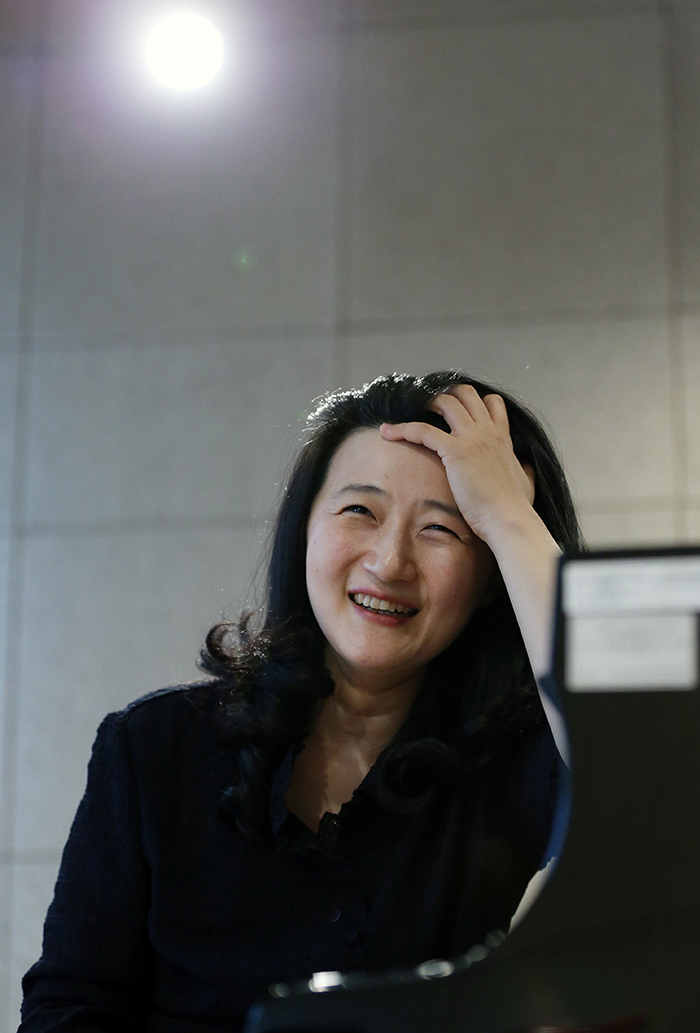
- What does the piano mean to you?
I would say it's my alter ego. It's such a fabulous instrument from every angle. It looks more striking when it makes a sound. I remember that when I first saw this instrument, I was like, "Wow, it's awesome. It's so beautiful."
Sometimes, it looked ugly, too, when I could not play it at my will. Then, it started looking like a monster that I wanted to beat down.
- If you have something to say to promising musicians, what would it be?
I grew up not being scolded by my parents or teachers that often. My teachers were the kind of people who just stepped back, watched me and listened to me whenever I got lost.
My last teacher, György Sebők, used to say to me, "You are like a star in the sky," the star that, he said, will have moved somewhere else when he comes again in three months. The travel distance is exactly how far I've come, he said.
He also used to ask me, "What is it that a sunflower needs the most? The answer is the sun and water. They are just what you need now, too. The sun and water."
Watching and waiting silently, as my own teachers did, is my educational dogma and at the same time my philosophy of life.
By Wi Tack-whan, Sohn JiAe
Korea.net Staff Writers
jiae5853@korea.kr

Pianist Choi Hie-yon has been on a journey to pursue Beethoven's music for 12 years. (photo: Jeon Han)
The 46-year-old pianist's journey to pursue the music of Ludwig van Beethoven (1770-1827) began in 2002 when she started a four-year project to undertake the full-length playing of all of Beethoven's 32 piano sonatas.
She then went on to hold a series of concerts accompanied by violinist Lee Mi-kyung in 2011 and 2012, covering all of Beethoven's violin sonatas.
The pianist didn't stop there. Most recently, last year she completed a cycle of all Beethoven piano trios, this time in collaboration with international virtuosos, including Italian violinist Ruggero Allifranchini and U.S. cellist Peter Stumpf.
Twelve years into her pursuit of the great composer, the pianist still finds it difficult. "I still have a long way to go."
Meanwhile, Choi realizes that what she's been doing is the most honorable thing to do as a musician. As she says, "I am so privileged to have communicated with audiences through the greatest composer, for such a long time. I am grateful and at the same time I feel great responsibility."
"For that reason, I can’t enjoy any 'lay-back moments' just yet since I still have a lot to do."

The fingers of pianist Choi Hie-yon dance on the keyboard. (photo: Jeon Han)
What brought her to where she is now are the ups and downs she had to go through, especially when she was far from home.
In high school, the young Choi decided to go abroad to expand her musical scope. She studied at the Berlin University of the Arts under Klaus Hellwig and Hans Leygraf. She graduated there with a doctorate in the Performing Arts.
In 1995, she crossed the ocean to study in the U.S., where she continued her studies at the Jacobs School of Music of Indiana University in Bloomington, Indiana, under György Sebők, and earned an Artist Diploma.
In 1999, the musician was appointed Professor at the College of Music of Seoul National University, unanimously for the first time in the university's history.
Beethoven was not always someone lovable for Choi. Sometimes, he could be the object of "love and hatred," especially when she was studying in Berlin. She had to endure harsh criticism, such as, "That doesn't even sound like Beethoven."
"I spent much time in agony, anxious to know what on earth were the 'Beethoven sounds' they [the German people] wanted to hear," she reminisced. "While doing the search," she said, "I underwent trials and errors and learned a lot."
Her relentless pursuit of Beethoven continues. The pianist is now in her run-up to another round of full-length Beethoven performances across the U.S. and Germany.
Recently, Korea.net met with Choi, who was on her way to Indiana to hold an upcoming Beethoven recital, to hear more of her stories.

Pianist Choi Hie-yon says, "My search for Beethoven is still ongoing." (photo: Jeon Han)
- Tell us what fascinated you the most about Beethoven.
I love the "positive energy" in his music. The first time I played his pieces, I never found it difficult at all. At that time, I didn't know each of the meanings embedded in his music. However, despite knowing nothing about it, everyone can feel the positive energy in his music.
As many people know, Beethoven was emotionally ill. Despite all the abuse and ordeals he had to endure throughout his life, he never succumbed to despair. Instead, he surmounted such difficulties through what he really loved: music. I believe his energy revived in each and every note he composed. I felt that energy from an early age. I admired what a hard-working person he was. He tried and tried until he reached the point of perfection.
Ironically, the more I delved into his music, the more I found it difficult. The more I dug into figuring out all the possible factors behind his positive energy, the more the process got difficult.
The energy, one that has been striking a chord with every listener for hundreds of years, was not made overnight. I believe that there are so many things behind the making of his music. I am still in the process of finding out what they really are.
- You have completed performances of all of Beethoven's piano sonatas. Many fans might be waiting for you to embark on another repertoire, let's say, Beethoven's piano concertos. Can we expect to see that happen sometime soon?
I've already done all his piano concertos, except No. 1, but I have not held a cycle of full-length performances with that repertoire yet, which I hope to try soon.
If given a chance, I'd like to do it together with a conductor with whom I can work in perfect harmony. A concerto cannot sound great unless one can keep in tune with another. Beethoven's music is so elaborate and sophisticated that it never sounds great if you don't have a great partner.

Pianist Choi Hie-yon says, "The positive energy in Beethoven's music is what has kept me on the journey to pursue his music to this day." (photo: Jeon Han)
- If you had something more to do with Beethoven's music, what would it be?
I've been actively holding concerts, not only here at home, but beyond my national borders, too. I hope to have another round of performances of all of Beethoven's piano sonatas. I also want to study more about his symphonies too.
- What's your favorite among Beethoven's works?
That is the million dollar question. It's hard to pinpoint just one. My study into his music is still ongoing. I still find something new from a piece that I didn't fully understand just a couple of years ago. I am sure if I am posed the same question three years later, I would probably give a different answer.
When I turn 70 or something, I could give you the, "Yes! This is it!" piece, I think.
- How did you start playing the piano?
Next to my house was a piano academy. When I was only three years old, I went there by chance, where I was drawn to the melodies coming from a piano. Out of curiosity, I tried to play the piano. To be honest, my mom opposed the idea of letting me learn how to play the instrument at such a young age, when I hadn't even completed the Korean alphabet yet. Noticing my musical talent early, a teacher there, however, encouraged me to keep doing it. We started so-called "lessons between ourselves." My disgruntled mom watched me over the months and finally approved.
As I didn't have a piano at home, I kept going in and out of the academy to practice. In retrospect, it was my hunger for music that made me that passionate about the instrument. I had such a sense of perfect pitch that I could spot each and every tune very quickly. I was also noticeably quick to read scores. I used to digest a score and start playing it on the piano all by myself.
I clung to the instrument, losing track of time. My teacher even scared me into going home, showing me a portrait of a scary-looking man, who turned out to be Beethoven.
- Your story is definitely a testament to the maxim, "Hard-working people cannot beat those who like what they do, and those who like what they do cannot beat those who enjoy it.” Isn't it?
Yes, it is. Those who enjoy themselves, whatever they do, grow by leaps and bounds. I can see the difference in progress between those students who enjoy every moment and those who don't.
- Tell us what made you choose to become a pianist.
At the age of 18 when I was studying in Berlin, I was so worried about my future. I was like, "Is this where I am meant to be?" Such concerns about my life and my path lasted for four or five years.
Whenever I won a competition and was showered with applause from the audience, I felt like, "Yes, this is it." Dark times, however, did not fail to emerge. All my years in Berlin were shadowed by worries and agony. Luckily, I survived, letting my self-identity form naturally, and then I reached the, "Right. This is my destiny," point.
- Did you ever have any sort of crisis in your career?
Of course I did, not just once or twice, but so many times. The worst moment was when my mental anguish spread over to the physical. It was in 1995, when I was in Berlin, when I suddenly could not play the piano anymore. My fingers hurt so much, as if the keyboard had sharp saw blades pricking them. It was strange. Doctors kept saying, "There's nothing wrong with your fingers." I didn't know what to do. I thought that this might be a message from God to stop playing.
At that time, I was getting ready for a very important competition, one for which I'd prepared for many years. I had no choice but to participate in such a bad condition, and I messed it up, as expected. My Swedish professor, Hans Leygraf, worried about me and supported me all the time, but it didn't work.
Since for many years I had put all my energy and sweat into music, I hardly had any time to look around and care about other things around me. I think my mental stress went to extremes. So I realized that I should put my life back in order and decided to move to the U.S. The stay in the country was like being in a nursing home. There, I got a good rest and my life and health got back to normal. I felt at ease, looking around the people around me and getting to know how to love the people that I loved. Then, my crisis naturally passed away.
- What are your future plans?
I will hold a series of performances with a Beethoven repertoire in August in Germany and also perform a concert of Beethoven's cello sonatas with an Austrian cellist there.
In October, I will hold two performances here at home, including one with the Seoul Philharmonic Orchestra.

Pianist Choi Hie-yon says that the piano can be something ugly that she sometimes doesn't want to see anymore, but, all in all, it's still her "alter ego." (photo: Jeon Han)
- What does the piano mean to you?
I would say it's my alter ego. It's such a fabulous instrument from every angle. It looks more striking when it makes a sound. I remember that when I first saw this instrument, I was like, "Wow, it's awesome. It's so beautiful."
Sometimes, it looked ugly, too, when I could not play it at my will. Then, it started looking like a monster that I wanted to beat down.
- If you have something to say to promising musicians, what would it be?
I grew up not being scolded by my parents or teachers that often. My teachers were the kind of people who just stepped back, watched me and listened to me whenever I got lost.
My last teacher, György Sebők, used to say to me, "You are like a star in the sky," the star that, he said, will have moved somewhere else when he comes again in three months. The travel distance is exactly how far I've come, he said.
He also used to ask me, "What is it that a sunflower needs the most? The answer is the sun and water. They are just what you need now, too. The sun and water."
Watching and waiting silently, as my own teachers did, is my educational dogma and at the same time my philosophy of life.
By Wi Tack-whan, Sohn JiAe
Korea.net Staff Writers
jiae5853@korea.kr




